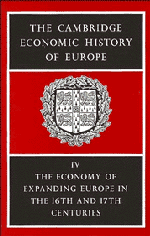Book contents
- Frontmatter
- Chapter I The Population of Europe from the Black Death to the Eve of the Vital Revolution
- Chapter II Scientific Method and the Progress of Techniques
- Chapter III Transport and Trade Routes
- Chapter IV European Economic Institutions and the New World; the Chartered Companies
- Chapter V Crops and Livestock
- Chapter VI Colonial Settlement and Its Labour Problems
- Chapter VII Prices in Europe from 1450 to 1750
- Chapter VIII Trade, Society and the State
- BIBLIOGRAPHIES
- References
Chapter VIII - Trade, Society and the State
Published online by Cambridge University Press: 28 March 2008
- Frontmatter
- Chapter I The Population of Europe from the Black Death to the Eve of the Vital Revolution
- Chapter II Scientific Method and the Progress of Techniques
- Chapter III Transport and Trade Routes
- Chapter IV European Economic Institutions and the New World; the Chartered Companies
- Chapter V Crops and Livestock
- Chapter VI Colonial Settlement and Its Labour Problems
- Chapter VII Prices in Europe from 1450 to 1750
- Chapter VIII Trade, Society and the State
- BIBLIOGRAPHIES
- References
Summary
The ‘mercantilist’ age was not idly so christened. Everywhere along the western seaboard of Europe and along the coastline of the Mediterranean from Malaga to Venice, in the centuries that stretched from the Renascence to the Enlightenment the merchants were the dynamic element in society. As the volume of trade grew, as the fleet of international shipping expanded, linking places and trades hitherto isolated, the operations of merchants and manufacturers slowly helped to change the face of western European society partly through the goods and manufactures they made available, partly through the social changes they wrought by introducing new or extending existing methods of manufacture, and partly through the influence they exercised directly or indirectly on the policies of Government. On any statistical basis, most men everywhere were still connected with the land in one way or another: but everywhere in the later Middle Ages and early modern age trade and tradesmen were undermining the crumbling walls of custom that surrounded the economic community of the Middle Ages.
It used to be possible for historians to delineate the major features of this emergent economy under the name of capitalism and it became fashionable to bracket capitalism and the Reformation together with the overt proposal that the latter explained, at all events in part, the former. It was assumed that the sixteenth century saw the birth, specifically in northern Europe, of a novel type of economic society based on energies and ambitions which were themselves old as man but were now in some way released for good or ill on society at large: and that Protestantism – and in particular the teaching of Calvin – was a prime mover in the process.
- Type
- Chapter
- Information
- Publisher: Cambridge University PressPrint publication year: 1967
References
- 3
- Cited by



